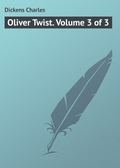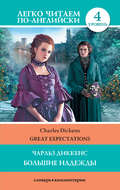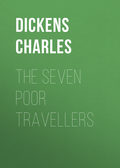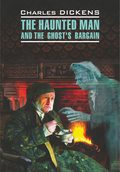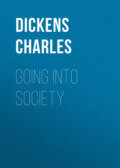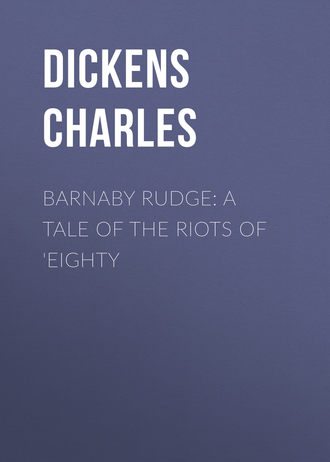
Чарльз Диккенс
Barnaby Rudge: A Tale of the Riots of 'Eighty
‘All’s over now,’ said the vintner. ‘Fifty thousand pounds will be scattered in a minute. We must save ourselves. We can do no more, and shall have reason to be thankful if we do as much.’
Their first impulse was, to clamber along the roofs of the houses, and, knocking at some garret window for admission, pass down that way into the street, and so escape. But another fierce cry from below, and a general upturning of the faces of the crowd, apprised them that they were discovered, and even that Mr Haredale was recognised; for Hugh, seeing him plainly in the bright glare of the fire, which in that part made it as light as day, called to him by his name, and swore to have his life.
‘Leave me here,’ said Mr Haredale, ‘and in Heaven’s name, my good friend, save yourself! Come on!’ he muttered, as he turned towards Hugh and faced him without any further effort at concealment: ‘This roof is high, and if we close, we will die together!’
‘Madness,’ said the honest vintner, pulling him back, ‘sheer madness. Hear reason, sir. My good sir, hear reason. I could never make myself heard by knocking at a window now; and even if I could, no one would be bold enough to connive at my escape. Through the cellars, there’s a kind of passage into the back street by which we roll casks in and out. We shall have time to get down there before they can force an entry. Do not delay an instant, but come with me – for both our sakes – for mine – my dear good sir!’
As he spoke, and drew Mr Haredale back, they had both a glimpse of the street. It was but a glimpse, but it showed them the crowd, gathering and clustering round the house: some of the armed men pressing to the front to break down the doors and windows, some bringing brands from the nearest fire, some with lifted faces following their course upon the roof and pointing them out to their companions: all raging and roaring like the flames they lighted up. They saw some men thirsting for the treasures of strong liquor which they knew were stored within; they saw others, who had been wounded, sinking down into the opposite doorways and dying, solitary wretches, in the midst of all the vast assemblage; here a frightened woman trying to escape; and there a lost child; and there a drunken ruffian, unconscious of the death-wound on his head, raving and fighting to the last. All these things, and even such trivial incidents as a man with his hat off, or turning round, or stooping down, or shaking hands with another, they marked distinctly; yet in a glance so brief, that, in the act of stepping back, they lost the whole, and saw but the pale faces of each other, and the red sky above them.
Mr Haredale yielded to the entreaties of his companion – more because he was resolved to defend him, than for any thought he had of his own life, or any care he entertained for his own safety – and quickly re-entering the house, they descended the stairs together. Loud blows were thundering on the shutters, crowbars were already thrust beneath the door, the glass fell from the sashes, a deep light shone through every crevice, and they heard the voices of the foremost in the crowd so close to every chink and keyhole, that they seemed to be hoarsely whispering their threats into their very ears. They had but a moment reached the bottom of the cellar-steps and shut the door behind them, when the mob broke in.
The vaults were profoundly dark, and having no torch or candle – for they had been afraid to carry one, lest it should betray their place of refuge – they were obliged to grope with their hands. But they were not long without light, for they had not gone far when they heard the crowd forcing the door; and, looking back among the low-arched passages, could see them in the distance, hurrying to and fro with flashing links, broaching the casks, staving the great vats, turning off upon the right hand and the left, into the different cellars, and lying down to drink at the channels of strong spirits which were already flowing on the ground.
They hurried on, not the less quickly for this; and had reached the only vault which lay between them and the passage out, when suddenly, from the direction in which they were going, a strong light gleamed upon their faces; and before they could slip aside, or turn back, or hide themselves, two men (one bearing a torch) came upon them, and cried in an astonished whisper, ‘Here they are!’
At the same instant they pulled off what they wore upon their heads. Mr Haredale saw before him Edward Chester, and then saw, when the vintner gasped his name, Joe Willet.
Ay, the same Joe, though with an arm the less, who used to make the quarterly journey on the grey mare to pay the bill to the purple-faced vintner; and that very same purple-faced vintner, formerly of Thames Street, now looked him in the face, and challenged him by name.
‘Give me your hand,’ said Joe softly, taking it whether the astonished vintner would or no. ‘Don’t fear to shake it; it’s a friendly one and a hearty one, though it has no fellow. Why, how well you look and how bluff you are! And you – God bless you, sir. Take heart, take heart. We’ll find them. Be of good cheer; we have not been idle.’
There was something so honest and frank in Joe’s speech, that Mr Haredale put his hand in his involuntarily, though their meeting was suspicious enough. But his glance at Edward Chester, and that gentleman’s keeping aloof, were not lost upon Joe, who said bluntly, glancing at Edward while he spoke:
‘Times are changed, Mr Haredale, and times have come when we ought to know friends from enemies, and make no confusion of names. Let me tell you that but for this gentleman, you would most likely have been dead by this time, or badly wounded at the best.’
‘What do you say?’ cried Mr Haredale.
‘I say,’ said Joe, ‘first, that it was a bold thing to be in the crowd at all disguised as one of them; though I won’t say much about that, on second thoughts, for that’s my case too. Secondly, that it was a brave and glorious action – that’s what I call it – to strike that fellow off his horse before their eyes!’
‘What fellow! Whose eyes!’
‘What fellow, sir!’ cried Joe: ‘a fellow who has no goodwill to you, and who has the daring and devilry in him of twenty fellows. I know him of old. Once in the house, HE would have found you, here or anywhere. The rest owe you no particular grudge, and, unless they see you, will only think of drinking themselves dead. But we lose time. Are you ready?’
‘Quite,’ said Edward. ‘Put out the torch, Joe, and go on. And be silent, there’s a good fellow.’
‘Silent or not silent,’ murmured Joe, as he dropped the flaring link upon the ground, crushed it with his foot, and gave his hand to Mr Haredale, ‘it was a brave and glorious action; – no man can alter that.’
Both Mr Haredale and the worthy vintner were too amazed and too much hurried to ask any further questions, so followed their conductors in silence. It seemed, from a short whispering which presently ensued between them and the vintner relative to the best way of escape, that they had entered by the back-door, with the connivance of John Grueby, who watched outside with the key in his pocket, and whom they had taken into their confidence. A party of the crowd coming up that way, just as they entered, John had double-locked the door again, and made off for the soldiers, so that means of retreat was cut off from under them.
However, as the front-door had been forced, and this minor crowd, being anxious to get at the liquor, had no fancy for losing time in breaking down another, but had gone round and got in from Holborn with the rest, the narrow lane in the rear was quite free of people. So, when they had crawled through the passage indicated by the vintner (which was a mere shelving-trap for the admission of casks), and had managed with some difficulty to unchain and raise the door at the upper end, they emerged into the street without being observed or interrupted. Joe still holding Mr Haredale tight, and Edward taking the same care of the vintner, they hurried through the streets at a rapid pace; occasionally standing aside to let some fugitives go by, or to keep out of the way of the soldiers who followed them, and whose questions, when they halted to put any, were speedily stopped by one whispered word from Joe.
Chapter 68
While Newgate was burning on the previous night, Barnaby and his father, having been passed among the crowd from hand to hand, stood in Smithfield, on the outskirts of the mob, gazing at the flames like men who had been suddenly roused from sleep. Some moments elapsed before they could distinctly remember where they were, or how they got there; or recollected that while they were standing idle and listless spectators of the fire, they had tools in their hands which had been hurriedly given them that they might free themselves from their fetters.
Barnaby, heavily ironed as he was, if he had obeyed his first impulse, or if he had been alone, would have made his way back to the side of Hugh, who to his clouded intellect now shone forth with the new lustre of being his preserver and truest friend. But his father’s terror of remaining in the streets, communicated itself to him when he comprehended the full extent of his fears, and impressed him with the same eagerness to fly to a place of safety.
In a corner of the market among the pens for cattle, Barnaby knelt down, and pausing every now and then to pass his hand over his father’s face, or look up to him with a smile, knocked off his irons. When he had seen him spring, a free man, to his feet, and had given vent to the transport of delight which the sight awakened, he went to work upon his own, which soon fell rattling down upon the ground, and left his limbs unfettered.
Gliding away together when this task was accomplished, and passing several groups of men, each gathered round a stooping figure to hide him from those who passed, but unable to repress the clanking sound of hammers, which told that they too were busy at the same work, – the two fugitives made towards Clerkenwell, and passing thence to Islington, as the nearest point of egress, were quickly in the fields. After wandering about for a long time, they found in a pasture near Finchley a poor shed, with walls of mud, and roof of grass and brambles, built for some cowherd, but now deserted. Here, they lay down for the rest of the night.
They wandered to and fro when it was day, and once Barnaby went off alone to a cluster of little cottages two or three miles away, to purchase some bread and milk. But finding no better shelter, they returned to the same place, and lay down again to wait for night.
Heaven alone can tell, with what vague hopes of duty, and affection; with what strange promptings of nature, intelligible to him as to a man of radiant mind and most enlarged capacity; with what dim memories of children he had played with when a child himself, who had prattled of their fathers, and of loving them, and being loved; with how many half-remembered, dreamy associations of his mother’s grief and tears and widowhood; he watched and tended this man. But that a vague and shadowy crowd of such ideas came slowly on him; that they taught him to be sorry when he looked upon his haggard face, that they overflowed his eyes when he stooped to kiss him, that they kept him waking in a tearful gladness, shading him from the sun, fanning him with leaves, soothing him when he started in his sleep – ah! what a troubled sleep it was – and wondering when SHE would come to join them and be happy, is the truth. He sat beside him all that day; listening for her footsteps in every breath of air, looking for her shadow on the gently-waving grass, twining the hedge flowers for her pleasure when she came, and his when he awoke; and stooping down from time to time to listen to his mutterings, and wonder why he was so restless in that quiet place. The sun went down, and night came on, and he was still quite tranquil; busied with these thoughts, as if there were no other people in the world, and the dull cloud of smoke hanging on the immense city in the distance, hid no vices, no crimes, no life or death, or cause of disquiet – nothing but clear air.
But the hour had now come when he must go alone to find out the blind man (a task that filled him with delight) and bring him to that place; taking especial care that he was not watched or followed on his way back. He listened to the directions he must observe, repeated them again and again, and after twice or thrice returning to surprise his father with a light-hearted laugh, went forth, at last, upon his errand: leaving Grip, whom he had carried from the jail in his arms, to his care.
Fleet of foot, and anxious to return, he sped swiftly on towards the city, but could not reach it before the fires began, and made the night angry with their dismal lustre. When he entered the town – it might be that he was changed by going there without his late companions, and on no violent errand; or by the beautiful solitude in which he had passed the day, or by the thoughts that had come upon him, – but it seemed peopled by a legion of devils. This flight and pursuit, this cruel burning and destroying, these dreadful cries and stunning noises, were THEY the good lord’s noble cause!
Though almost stupefied by the bewildering scene, still he found the blind man’s house. It was shut up and tenantless.
He waited for a long while, but no one came. At last he withdrew; and as he knew by this time that the soldiers were firing, and many people must have been killed, he went down into Holborn, where he heard the great crowd was, to try if he could find Hugh, and persuade him to avoid the danger, and return with him.
If he had been stunned and shocked before, his horror was increased a thousandfold when he got into this vortex of the riot, and not being an actor in the terrible spectacle, had it all before his eyes. But there, in the midst, towering above them all, close before the house they were attacking now, was Hugh on horseback, calling to the rest!
Sickened by the sights surrounding him on every side, and by the heat and roar, and crash, he forced his way among the crowd (where many recognised him, and with shouts pressed back to let him pass), and in time was nearly up with Hugh, who was savagely threatening some one, but whom or what he said, he could not, in the great confusion, understand. At that moment the crowd forced their way into the house, and Hugh – it was impossible to see by what means, in such a concourse – fell headlong down.
Barnaby was beside him when he staggered to his feet. It was well he made him hear his voice, or Hugh, with his uplifted axe, would have cleft his skull in twain.
‘Barnaby – you! Whose hand was that, that struck me down?’
‘Not mine.’
‘Whose! – I say, whose!’ he cried, reeling back, and looking wildly round. ‘What are you doing? Where is he? Show me!’
‘You are hurt,’ said Barnaby – as indeed he was, in the head, both by the blow he had received, and by his horse’s hoof. ‘Come away with me.’
As he spoke, he took the horse’s bridle in his hand, turned him, and dragged Hugh several paces. This brought them out of the crowd, which was pouring from the street into the vintner’s cellars.
‘Where’s – where’s Dennis?’ said Hugh, coming to a stop, and checking Barnaby with his strong arm. ‘Where has he been all day? What did he mean by leaving me as he did, in the jail, last night? Tell me, you – d’ye hear!’
With a flourish of his dangerous weapon, he fell down upon the ground like a log. After a minute, though already frantic with drinking and with the wound in his head, he crawled to a stream of burning spirit which was pouring down the kennel, and began to drink at it as if it were a brook of water.
Barnaby drew him away, and forced him to rise. Though he could neither stand nor walk, he involuntarily staggered to his horse, climbed upon his back, and clung there. After vainly attempting to divest the animal of his clanking trappings, Barnaby sprung up behind him, snatched the bridle, turned into Leather Lane, which was close at hand, and urged the frightened horse into a heavy trot.
He looked back, once, before he left the street; and looked upon a sight not easily to be erased, even from his remembrance, so long as he had life.
The vintner’s house with a half-a-dozen others near at hand, was one great, glowing blaze. All night, no one had essayed to quench the flames, or stop their progress; but now a body of soldiers were actively engaged in pulling down two old wooden houses, which were every moment in danger of taking fire, and which could scarcely fail, if they were left to burn, to extend the conflagration immensely. The tumbling down of nodding walls and heavy blocks of wood, the hooting and the execrations of the crowd, the distant firing of other military detachments, the distracted looks and cries of those whose habitations were in danger, the hurrying to and fro of frightened people with their goods; the reflections in every quarter of the sky, of deep, red, soaring flames, as though the last day had come and the whole universe were burning; the dust, and smoke, and drift of fiery particles, scorching and kindling all it fell upon; the hot unwholesome vapour, the blight on everything; the stars, and moon, and very sky, obliterated; – made up such a sum of dreariness and ruin, that it seemed as if the face of Heaven were blotted out, and night, in its rest and quiet, and softened light, never could look upon the earth again.
But there was a worse spectacle than this – worse by far than fire and smoke, or even the rabble’s unappeasable and maniac rage. The gutters of the street, and every crack and fissure in the stones, ran with scorching spirit, which being dammed up by busy hands, overflowed the road and pavement, and formed a great pool, into which the people dropped down dead by dozens. They lay in heaps all round this fearful pond, husbands and wives, fathers and sons, mothers and daughters, women with children in their arms and babies at their breasts, and drank until they died. While some stooped with their lips to the brink and never raised their heads again, others sprang up from their fiery draught, and danced, half in a mad triumph, and half in the agony of suffocation, until they fell, and steeped their corpses in the liquor that had killed them. Nor was even this the worst or most appalling kind of death that happened on this fatal night. From the burning cellars, where they drank out of hats, pails, buckets, tubs, and shoes, some men were drawn, alive, but all alight from head to foot; who, in their unendurable anguish and suffering, making for anything that had the look of water, rolled, hissing, in this hideous lake, and splashed up liquid fire which lapped in all it met with as it ran along the surface, and neither spared the living nor the dead. On this last night of the great riots – for the last night it was – the wretched victims of a senseless outcry, became themselves the dust and ashes of the flames they had kindled, and strewed the public streets of London.
With all he saw in this last glance fixed indelibly upon his mind, Barnaby hurried from the city which enclosed such horrors; and holding down his head that he might not even see the glare of the fires upon the quiet landscape, was soon in the still country roads.
He stopped at about half-a-mile from the shed where his father lay, and with some difficulty making Hugh sensible that he must dismount, sunk the horse’s furniture in a pool of stagnant water, and turned the animal loose. That done, he supported his companion as well as he could, and led him slowly forward.
Chapter 69
It was the dead of night, and very dark, when Barnaby, with his stumbling comrade, approached the place where he had left his father; but he could see him stealing away into the gloom, distrustful even of him, and rapidly retreating. After calling to him twice or thrice that there was nothing to fear, but without effect, he suffered Hugh to sink upon the ground, and followed to bring him back.
He continued to creep away, until Barnaby was close upon him; then turned, and said in a terrible, though suppressed voice:
‘Let me go. Do not lay hands upon me. You have told her; and you and she together have betrayed me!’
Barnaby looked at him, in silence.
‘You have seen your mother!’
‘No,’ cried Barnaby, eagerly. ‘Not for a long time – longer than I can tell. A whole year, I think. Is she here?’
His father looked upon him steadfastly for a few moments, and then said – drawing nearer to him as he spoke, for, seeing his face, and hearing his words, it was impossible to doubt his truth:
‘What man is that?’
‘Hugh – Hugh. Only Hugh. You know him. HE will not harm you. Why, you’re afraid of Hugh! Ha ha ha! Afraid of gruff, old, noisy Hugh!’
‘What man is he, I ask you,’ he rejoined so fiercely, that Barnaby stopped in his laugh, and shrinking back, surveyed him with a look of terrified amazement.
‘Why, how stern you are! You make me fear you, though you are my father. Why do you speak to me so?’
– ‘I want,’ he answered, putting away the hand which his son, with a timid desire to propitiate him, laid upon his sleeve, – ‘I want an answer, and you give me only jeers and questions. Who have you brought with you to this hiding-place, poor fool; and where is the blind man?’
‘I don’t know where. His house was close shut. I waited, but no person came; that was no fault of mine. This is Hugh – brave Hugh, who broke into that ugly jail, and set us free. Aha! You like him now, do you? You like him now!’
‘Why does he lie upon the ground?’
‘He has had a fall, and has been drinking. The fields and trees go round, and round, and round with him, and the ground heaves under his feet. You know him? You remember? See!’
They had by this time returned to where he lay, and both stooped over him to look into his face.
‘I recollect the man,’ his father murmured. ‘Why did you bring him here?’
‘Because he would have been killed if I had left him over yonder. They were firing guns and shedding blood. Does the sight of blood turn you sick, father? I see it does, by your face. That’s like me – What are you looking at?’
‘At nothing!’ said the murderer softly, as he started back a pace or two, and gazed with sunken jaw and staring eyes above his son’s head. ‘At nothing!’
He remained in the same attitude and with the same expression on his face for a minute or more; then glanced slowly round as if he had lost something; and went shivering back, towards the shed.
‘Shall I bring him in, father?’ asked Barnaby, who had looked on, wondering.
He only answered with a suppressed groan, and lying down upon the ground, wrapped his cloak about his head, and shrunk into the darkest corner.
Finding that nothing would rouse Hugh now, or make him sensible for a moment, Barnaby dragged him along the grass, and laid him on a little heap of refuse hay and straw which had been his own bed; first having brought some water from a running stream hard by, and washed his wound, and laved his hands and face. Then he lay down himself, between the two, to pass the night; and looking at the stars, fell fast asleep.
Awakened early in the morning, by the sunshine and the songs of birds, and hum of insects, he left them sleeping in the hut, and walked into the sweet and pleasant air. But he felt that on his jaded senses, oppressed and burdened with the dreadful scenes of last night, and many nights before, all the beauties of opening day, which he had so often tasted, and in which he had had such deep delight, fell heavily. He thought of the blithe mornings when he and the dogs went bounding on together through the woods and fields; and the recollection filled his eyes with tears. He had no consciousness, God help him, of having done wrong, nor had he any new perception of the merits of the cause in which he had been engaged, or those of the men who advocated it; but he was full of cares now, and regrets, and dismal recollections, and wishes (quite unknown to him before) that this or that event had never happened, and that the sorrow and suffering of so many people had been spared. And now he began to think how happy they would be – his father, mother, he, and Hugh – if they rambled away together, and lived in some lonely place, where there were none of these troubles; and that perhaps the blind man, who had talked so wisely about gold, and told him of the great secrets he knew, could teach them how to live without being pinched by want. As this occurred to him, he was the more sorry that he had not seen him last night; and he was still brooding over this regret, when his father came, and touched him on the shoulder.
‘Ah!’ cried Barnaby, starting from his fit of thoughtfulness. ‘Is it only you?’
‘Who should it be?’
‘I almost thought,’ he answered, ‘it was the blind man. I must have some talk with him, father.’
‘And so must I, for without seeing him, I don’t know where to fly or what to do, and lingering here, is death. You must go to him again, and bring him here.’
‘Must I!’ cried Barnaby, delighted; ‘that’s brave, father. That’s what I want to do.’
‘But you must bring only him, and none other. And though you wait at his door a whole day and night, still you must wait, and not come back without him.’
‘Don’t you fear that,’ he cried gaily. ‘He shall come, he shall come.’
‘Trim off these gewgaws,’ said his father, plucking the scraps of ribbon and the feathers from his hat, ‘and over your own dress wear my cloak. Take heed how you go, and they will be too busy in the streets to notice you. Of your coming back you need take no account, for he’ll manage that, safely.’
‘To be sure!’ said Barnaby. ‘To be sure he will! A wise man, father, and one who can teach us to be rich. Oh! I know him, I know him.’
He was speedily dressed, and as well disguised as he could be. With a lighter heart he then set off upon his second journey, leaving Hugh, who was still in a drunken stupor, stretched upon the ground within the shed, and his father walking to and fro before it.
The murderer, full of anxious thoughts, looked after him, and paced up and down, disquieted by every breath of air that whispered among the boughs, and by every light shadow thrown by the passing clouds upon the daisied ground. He was anxious for his safe return, and yet, though his own life and safety hung upon it, felt a relief while he was gone. In the intense selfishness which the constant presence before him of his great crimes, and their consequences here and hereafter, engendered, every thought of Barnaby, as his son, was swallowed up and lost. Still, his presence was a torture and reproach; in his wild eyes, there were terrible images of that guilty night; with his unearthly aspect, and his half-formed mind, he seemed to the murderer a creature who had sprung into existence from his victim’s blood. He could not bear his look, his voice, his touch; and yet he was forced, by his own desperate condition and his only hope of cheating the gibbet, to have him by his side, and to know that he was inseparable from his single chance of escape.
He walked to and fro, with little rest, all day, revolving these things in his mind; and still Hugh lay, unconscious, in the shed. At length, when the sun was setting, Barnaby returned, leading the blind man, and talking earnestly to him as they came along together.
The murderer advanced to meet them, and bidding his son go on and speak to Hugh, who had just then staggered to his feet, took his place at the blind man’s elbow, and slowly followed, towards the shed.
‘Why did you send HIM?’ said Stagg. ‘Don’t you know it was the way to have him lost, as soon as found?’
‘Would you have had me come myself?’ returned the other.
‘Humph! Perhaps not. I was before the jail on Tuesday night, but missed you in the crowd. I was out last night, too. There was good work last night – gay work – profitable work’ – he added, rattling the money in his pockets.
‘Have you – ’
– ‘Seen your good lady? Yes.’
‘Do you mean to tell me more, or not?’
‘I’ll tell you all,’ returned the blind man, with a laugh. ‘Excuse me – but I love to see you so impatient. There’s energy in it.’
‘Does she consent to say the word that may save me?’
‘No,’ returned the blind man emphatically, as he turned his face towards him. ‘No. Thus it is. She has been at death’s door since she lost her darling – has been insensible, and I know not what. I tracked her to a hospital, and presented myself (with your leave) at her bedside. Our talk was not a long one, for she was weak, and there being people near I was not quite easy. But I told her all that you and I agreed upon, and pointed out the young gentleman’s position, in strong terms. She tried to soften me, but that, of course (as I told her), was lost time. She cried and moaned, you may be sure; all women do. Then, of a sudden, she found her voice and strength, and said that Heaven would help her and her innocent son; and that to Heaven she appealed against us – which she did; in really very pretty language, I assure you. I advised her, as a friend, not to count too much on assistance from any such distant quarter – recommended her to think of it – told her where I lived – said I knew she would send to me before noon, next day – and left her, either in a faint or shamming.’
When he had concluded this narration, during which he had made several pauses, for the convenience of cracking and eating nuts, of which he seemed to have a pocketful, the blind man pulled a flask from his pocket, took a draught himself, and offered it to his companion.
‘You won’t, won’t you?’ he said, feeling that he pushed it from him. ‘Well! Then the gallant gentleman who’s lodging with you, will. Hallo, bully!’
‘Death!’ said the other, holding him back. ‘Will you tell me what I am to do!’
‘Do! Nothing easier. Make a moonlight flitting in two hours’ time with the young gentleman (he’s quite ready to go; I have been giving him good advice as we came along), and get as far from London as you can. Let me know where you are, and leave the rest to me. She MUST come round; she can’t hold out long; and as to the chances of your being retaken in the meanwhile, why it wasn’t one man who got out of Newgate, but three hundred. Think of that, for your comfort.’



